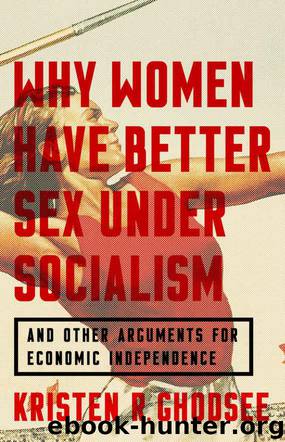Why Women Have Better Sex Under Socialism by Ghodsee Kristen R

Author:Ghodsee, Kristen R. [Ghodsee, Kristen R.]
Language: eng
Format: azw3
Publisher: PublicAffairs
Published: 2018-11-19T16:00:00+00:00
Sexual economics theory has been attacked by other psychologists as being based on the flawed assumption that women’s sex drives are weaker than men’s and that women have a “natural” desire to extract resources from men in exchange for sex. Feminists have also pointed to the deeply patriarchal and misogynistic assumptions embedded in sexual economics theory, since the price of sex also varies with the perceived desirability of the woman offering it (as determined by the male buyers). Others have criticized the economistic thinking that reduces romance and mutual affection to an adversarial competition between men and women in which each side is trying to get the best deal. While these critiques are important, sexual economics theory has won many followers because it seems intuitive, especially in the individualistic and materialistic culture of the United States.4
In fact, some American right-wingers have embraced sexual economics theory as a way of blaming women for the current ills of our society. Indeed, a viral 2014 animated YouTube video from the conservative Austin Institute for the Study of Family and Culture extrapolated from the work of Baumeister and Vohs and blamed the falling marriage rate and the social maladjustment of young men in the United States on loose women who have made the price of sex too low. In their worldview, the availability of birth control (and one presumes abortion) has reduced the risks associated with sex, since it is now less likely to result in an unwanted pregnancy that must be carried to term. When sex entailed the risk of parenthood, they argue, women extracted a much higher price for access to their bodies, at minimum a serious commitment and ideally marriage. But once birth control reduced the risk of pregnancy, women could do with their bodies as they liked, and the price they demanded for sex fell, particularly since they had other opportunities to earn money.5
Is this a terrible thing? Other than the falling marriage rate (the old “Why buy the cow when you can get the milk for free?” argument), a low price for sex harms men who, according to these theories, apparently have no incentive to do anything with their lives other than the pursuit of sex. This is not a joke, I assure you. According to the ideologues over at the Austin Institute, young men these days are camping out in their parent’s basements, playing video games, and subsisting on Domino’s pizza because cheap sex is just a text away. When women have no birth control, the price of sex is higher. When women have no access to abortion, the price is higher still. When women have fewer educational or economic opportunities outside of their relationships with men, the price for sex is usually marriage. When the price of sex is very high, according to this worldview, sex-starved men have incentives to go out and get jobs, earn money, and make something of their lives so they can buy access to a woman’s sexuality for life through marriage. In
Download
This site does not store any files on its server. We only index and link to content provided by other sites. Please contact the content providers to delete copyright contents if any and email us, we'll remove relevant links or contents immediately.
| Anarchism | Communism & Socialism |
| Conservatism & Liberalism | Democracy |
| Fascism | Libertarianism |
| Nationalism | Radicalism |
| Utopian |
The Secret History by Donna Tartt(19092)
The Social Justice Warrior Handbook by Lisa De Pasquale(12191)
Thirteen Reasons Why by Jay Asher(8912)
This Is How You Lose Her by Junot Diaz(6889)
Weapons of Math Destruction by Cathy O'Neil(6281)
Zero to One by Peter Thiel(5802)
Beartown by Fredrik Backman(5759)
The Myth of the Strong Leader by Archie Brown(5509)
The Fire Next Time by James Baldwin(5449)
How Democracies Die by Steven Levitsky & Daniel Ziblatt(5219)
Promise Me, Dad by Joe Biden(5154)
Stone's Rules by Roger Stone(5088)
A Higher Loyalty: Truth, Lies, and Leadership by James Comey(4964)
100 Deadly Skills by Clint Emerson(4927)
Rise and Kill First by Ronen Bergman(4790)
Secrecy World by Jake Bernstein(4753)
The David Icke Guide to the Global Conspiracy (and how to end it) by David Icke(4720)
The Farm by Tom Rob Smith(4514)
The Doomsday Machine by Daniel Ellsberg(4490)
